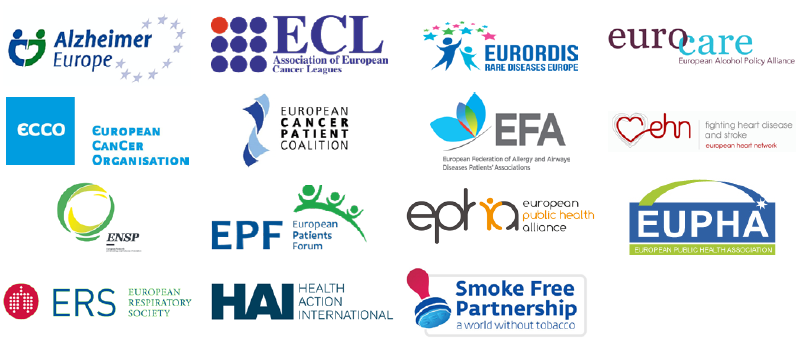Joint Statement: Europe, Let's Do More for Health!

Our Vision for Health in the European Union
We believe that a Europe where all people are as healthy as they can be throughout their lives is possible. A Europe that promotes well-being for all people of all ages, and where people can live, work and age in sustainable and healthy environments. A Europe that supports timely access to affordable, high quality healthcare for all.
Our common asks from the European Commission
The Lisbon Strategy includes a target of adding two healthy life years on average across the EU by 2020 - a target that still needs to be met. We need strong political leadership from the European Commission to achieve this goal. This requires a Commission Vice-President and a Directorate General dedicated to health, to ensure that health protection and promotion is guaranteed across all European Commission portfolios. Strong leadership on health will resonate with European citizens¹ and bring the EU closer to them, restoring people’s trust in the EU institutions.
KEY ASK 1 - ESTABLISH STRONG LEADERSHIP ON HEALTH

We call for targeted and effective EU action to ensure healthy lives in healthy environments. We call for an EU leadership that respects EU treaty provisions on health, as well as its international commitments. The EU should enable Member States to effectively address the unprecedented health challenges they are facing. The EU should implement ambitious policies to meet all 17 UN Sustainable Development Goals (SDGs) to which it has committed, and in particular SDG 3, Ensure healthy lives and promote wellbeing for all at all ages. The achievement of the UN Agenda 2030 for Sustainable Development is predicated on good health; it is a necessary precondition, as well as an outcome.
WHY? The EU has a health competence. Protection of high level of human health and well-being is entrenched in the Treaties of the European Union.² There is significant and tangible added value of EU policy action and collaboration on health, in addressing common public health threats which no single Member State can tackle alone. The EU has a responsibility to the global health agenda and a leadership role to play. Both the EU and all Member States have committed to implement the United Nations Sustainable Development Goals.³
KEY ASK 2 – ADOPT EU-LEVEL LEGISLATION TO PREVENT DISEASES

Prevention is better than cure: the EU should add value and a European dimension to the Member States’ efforts on disease prevention. Drawing on available evidence, and in collaboration with the OECD and the WHO, the EU should step up and propose legislation and policies that address effectively the main risk factors for non-communicable diseases (tobacco use, unhealthy diets, physical inactivity, alcohol consumption, environmental factors),⁴ to protect public health and to reduce the burden on European healthcare systems.
WHY? Health is an area that delivers major returns of investments. Every euro invested in public health gives an average return of 14 euros to the economy.⁵ Every additional average year of life expectancy is worth a boost to GDP of up to 4%.⁶
KEY ASK 3 – DEVELOP A FRAMEWORK FOR TACKLING NON-COMMUNICABLE DISEASES

Following requests from Member States and the European Parliament, the EU should support the fight against NCDs, the obesity epidemic, and mental disorders, and address the challenges related to an aging population.⁷ We call for an EU Framework to tackle NCDs, to meet the target SDG3.4.⁸
WHY? The high and increasing prevalence of chronic, non-communicable – and largely preventable – conditions, along with demographic changes, put the sustainability of our healthcare systems at risk. 70 to 80% of healthcare budgets are spent on NCDs. This corresponds to €700 billion per annum in the European Union, and the figures are projected to rise in the coming years.⁹ The World Economic Forum and the Harvard School of Public Health predict that NCDs diseases will result in a cumulative loss in global economic output of $47 trillion, or 5% of GDP, by 2030, principally through heart disease, stroke, alcohol misuse and depression in high and upper-middle income countries.¹⁰
KEY ASK 4 – SUPPORT NATIONAL HEALTH SYSTEMS WITH EXPERTISE AND EVIDENCE

The EU should play a key role in monitoring and benchmarking of health systems in Member States. It should drive ambitious yet achievable goals, set milestones and reduce health inequalities in Europe. EU Heads of State have committed to delivering the European Pillar of Social Rights as well as the SDG target for universal health coverage (SDG3.8).¹¹ Both should be actively supported by the European Semester recommendations. Europe needs a robust next-generation health programme that also addresses cross-border issues by introducing innovative solutions for healthcare delivery including digital health, maintaining and further developing collaborative actions, such as the European Reference Networks, as well as providing support to Member States in the form of expertise and exchange of data, evidence and good practice. There are common Europe wide health challenges where the EU can bring added value to complement national actions. Europe is not yet on track to meet SDG3.3. We call for increased and more closely coordinated efforts to fight communicable diseases.¹² As regards antimicrobial resistance (AMR), the EU has recently issued its One Health Action Plan. However, this plan lacks concrete targets, so we call on the EU to set targets that are measurable and ambitious. Another example is vaccination. We call for strengthened cooperation at EU level on vaccination policies, programmes and communication campaigns for equitable access to vaccines and to enhance public trust in evidence-based immunisation programmes.¹³ There is a European dimension of accessibility where the EU can explore further means to support member states whilst respecting the principle of subsidiarity. Affordable access to safe and effective prevention measures and treatment is essential for the protection of public health.
WHY? Bacteria and drug resistance cannot be stopped by borders. The impact of widespread AMR, if we fail to act, is unimaginable: 10 million deaths globally every year by 2050.¹⁴ No single country can tackle that challenge alone, as even wealthier countries will not be immune. Discussions about the need to improve vaccination coverage are intensifying throughout the EU. Alongside other factors, supply shortages and the decrease of public confidence in vaccination programmes are increasingly identified as barriers to immunisation. There is an urgent need to step up EU leadership of collaborative efforts that will ensure adequate vaccination coverage for the protection of public health.¹⁵ Stimulating investment in health is beneficial to the European economy as a whole. 550,000 people of working age die from NCDs in the EU every year. This causes a largely avoidable loss to the EU economy of €115 billion per year, corresponding to 0.8% of GDP.¹⁵ Health is a positive economic driver in itself, raising productivity, labour market participation, wellbeing, happiness and socialcohesion.
KEY ASK 5 – EMPOWER CITIZENS AND PATIENTS

As a means to implement the European Pillar on Social Rights, the EU should drive patients’ and citizens’ empowerment. For now, the different dimensions of patient empowerment (health literacy, self-management, shared decision-making between patients and health professionals) are addressed through stand-alone projects and initiatives. We need a framework to advance on the strategic issue of citizen and patient empowerement in a coherent, meaningful way.
WHY? A population fully engaged in preserving and promoting health will contribute to improving health outcomes and increasing well-being of people in the EU – a distinct treaty objective (TEU Article 3). An additional benefit is an increased productivity.
KEY ASK 6 – ASSESS THE IMPACT ON HEALTH OF EU POLICIES

All actions and policies must ensure a high level of human health protection. Health impact assessment (HIA) is an instrument that allows regulators to identify potential risks to health in proposals for policies and actions. We call on the EU to develop and routinely deploy a robust HIA methodology to respect Article 168 of the TFEU. In a first phase, the focus could be on research, environment, agriculture, trade, transport, urban planning and cohesion policy.
WHY? Population health is a precondition for economic prosperity. In line with the treaty, the EU has a duty ensure that all policies and programmes make a positive contribution and do not harm public health or undermine health goals and commitments.
Signatories:
Alzheimer Europe, Association of European Cancer Leagues (ECL), Eurordis Rare Diseases Europe, European Alcohol Policy Alliance (Eurocare), European CanCer Organisation (ECCO), European Cancer Patient Coalition (ECPC), European Federation of Allergies & Airways Disease (EFA), European Heart Network (EHN), European Network for Smoking Prevention (ENSP), European Patients’ Forum (EPF), European Public Health Alliance (EPHA), European Public Health Association (EUPHA), European Respiratory Society (ERS), Health Action International Europe (HAI Europe), Smoke Free Partnership (SFP).
NOTES
- Public Opinion, European Commission, http://ec.europa.eu/commfrontoffice/publicopinion/index.cfm/Survey/ getSurveyDetail/instruments/STANDARD/surveyKy/2143. Would you like the EU to intervene less than at present or more than at present for the following policy areas? European Parliament, http://www.europarl.europa.eu/external/ html/eurobarometer-052017/default_en.htm.
- Article 168(1) TFEU requires that “A high level of human health protection shall be ensured in the definition and implementation of all Union policies and activities.” This ‘mainstreaming’ obligation can also be found in Article 114(3) TFEU, and has been further reinforced following the entry into force of the Lisbon Treaty, by Article 9 TFEU and Article 35 of the EU Charter.
- Next steps for a sustainable European future, European Commission, https://ec.europa.eu/europeaid/sites/devco/ files/communication-next-steps-sustainable-europe-20161122_en.pdf.
- As an example, concrete proposals such as the EU setting mandatory maximum levels of trans-fatty acids in the area of food, or mandatory labelling requirements of alcoholic beverages would be feasible within the competences and mandate of the Commission, based on the EU treaties.
- Masters R, Anwar E, Collins B, et al., Return on investment of public health interventions: a systematic review, J Epidemiol Community Health, http://jech.bmj.com/content/early/2017/03/07/jech-2016-208141.
- Diseases and development: Does life expectancy increase income growth?, CEPR’s Policy Portal, http:// voxeu.org/article/disease-and-development-does-living-longer-raise-economic-growth. Bloom E.D., Canning D., Population Health and Economic Growth, https://siteresources.worldbank.org/EXTPREMNET/ Resources/489960-1338997241035/Growth_Commission_Working_Paper_24_Population_Health_Economic_ Growth.pdf.
- The use of term ’Chronic Disease’ which is the terminology for NCDs in the EU context shall be revised as it does not reflect the complexity of conditions (e.g. mental health, obesity). There is limited scientific evidence for the categorisation of those conditions as ‘diseases’ or ‘disorders’. Likewise there is no clear distinction between some communicable diseases which become chronic, [such as HIV and Hepatitis].
- SDG3.4: by 2030 reduce by one-third pre-mature mortality from non-communicable diseases (NCDs) through prevention and treatment, and promote mental health and wellbeing.
- United to reverse the rise in chronic disease, ECDA, http://www.alliancechronicdiseases.org/fileadmin/user_upload/ ECDA-poster-web.pdf.
- Bloom D.E., David B. et al. (2011), The Global Economic Burden of Non-communicable Diseases, World Economic Forum, Geneva, http://www3.weforum.org/docs/WEF_Harvard_HE_ GlobalEconomicBurdenNonCommunicableDiseases_2011.pdf.
- SDG3.8: achieve universal health coverage (UHC), including financial risk protection, access to quality essential health care services, and access to safe, effective, quality, and affordable essential medicines and vaccines for all
- SDG3.3 By 2030, end the epidemics of AIDS, tuberculosis, malaria and neglected tropical diseases and combat hepatitis, water-borne diseases and other communicable diseases.
- Recent measles outbreaks are an example of the threat we face. About 19.000 cases were reported in the EU between January 2016 and October 2017, including 44 deaths. The highest number of cases in 2017 were reported in Romania (7.570), Italy (4.617) and Germany (891). https://ec.europa.eu/health/vaccination/overview_en
- Review on Antimicrobial Resistance, AMR, https://amr-review.org/home.
- https://ecdc.europa.eu/en/news-events/measles-eueea-current-outbreaks-latest-data-and-trends-october-2017, http://www.euro.who.int/en/countries/romania/news/news/2017/10/stopping-measles-in-romania
- Europe paying a heavy price for chronic diseases, finds new OECD-EC report, OECD, http://www.oecd.org/health/ europe-paying-a-heavy-price-for-chronic-diseases-finds-new-oecd-ec-report.htm.
- Empowerment is defined as a “process that helps people gain control over their own lives and increases their capacity to act on issues that they themselves define as important”. See European Patients’ Forum, http://www.eupatient.eu/whatwedo/Policy/patient-empowerment/

